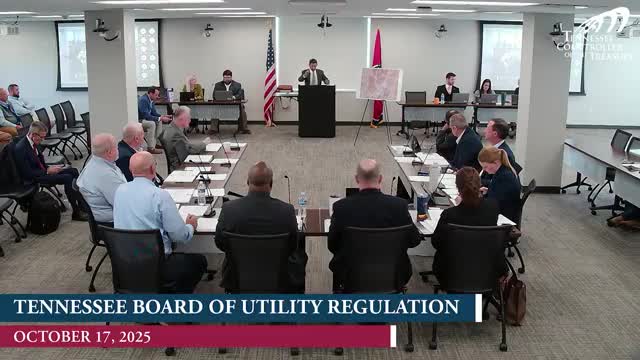Tennessee board dismisses complaint after City of Memphis says gravity sewer line is not on parcel
Get AI-powered insights, summaries, and transcripts
Subscribe
Summary
A property owner seeking sewer service near Egypt Central Road argued a stub and gravity line near his parcel entitled him to service under a new Tennessee statute. Memphis officials said the city’s gravity sewer line is in the right-of-way, not on the owner’s parcel, and the board dismissed the complaint.
The Tennessee Board of Utility Regulation on Oct. 21 dismissed a complaint brought by a property owner asking the City of Memphis to allow a connection under a newly enacted state law that requires utilities to offer connections when an existing gravity sewer line lies on the owner’s property.
Property owner Danny Tabrizi told the board the 20‑acre site at 4853 Egypt Central Road abuts gravity sewer infrastructure placed about 25 years earlier; he said there is a capped stub at the southwest corner of the parcel and an 8‑inch gravity line along Egypt Central and that the new law (Public Chapter 461, codified as Tenn. Code Ann. § 7‑82‑710) requires the city to provide a connection if a gravity sewer line exists on the property. He asked the board to order Memphis to grant the connection.
City of Memphis counsel C.C. Drayton and Public Works Director Scott Morgan told the board that while sewer infrastructure exists immediately adjacent to the parcel and a stub was extended in the right‑of‑way decades ago, the city does not own a gravity sewer line located on the subject parcel. Morgan said the stub and the right‑of‑way placement of the public sewer mean the statutory condition — an existing gravity sewer line located on the owner’s property — is not satisfied.
Memphis further told the board the city’s decision rests on the specific statutory language and on practical concerns about private lateral connections, capacity and municipal policy; Drayton said the city has relied on legal counsel’s interpretation of the new law. Board staff noted the new statute is a specific addition to existing customer complaint authority but said it is limited to the factual condition named in the law.
After discussion the board voted to dismiss the complaint on the legal basis that the statute’s condition was not met — there was no gravity sewer line on the owner’s parcel. The board’s counsel advised the complainant that a separate customer complaint under the board’s general authority could be refiled if other grounds exist.
Board members and staff encouraged the parties to continue local discussions about sewer access, annexation and development policy but said the specific statutory path the complainant cited did not apply on the record before the board.
